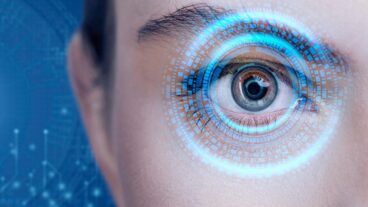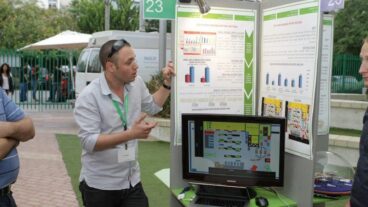Alzheimer’s is a frightening disease. The slow, painful slide into dementia is awful not only for the patient, but for the family left behind watching helplessly as their loved one slips away mentally long before their body gives up life.
Today almost 10% percent of people aged over 65 in the US suffer from Alzheimer’s, a figure that is growing as the population ages. Despite this, early diagnosis is rare, because at its start, Alzheimer’s is hard to differentiate from the normal aging process.
Now an Israeli company – NexSig Neurological Examination Technologies – has developed a new computerized assessment software that can help identify patients at risk of Alzheimer’s before the illness sets in, giving them a chance to ward off the disease for as long as possible.
For many years, Alzheimer’s was thought to be untreatable, but in the past decade scientists have developed new drugs that can provide some help, but only if they are given in the early phases of the disease before the damage becomes irreversible.
The trouble is that Alzheimer’s, like other neurological disorders – which are diagnosed through a battery of tests, blood tests and brain imaging studies – are mostly only identified when clear indications of cognitive or motor impairment are already present. By then, it’s often too late. The tests also rely heavily on human evaluation, which is not only time-consuming and expensive, but can be subjective as well.
“Very few experts do the job of evaluation well,” Dr. Vered Aharonson, the CTO and co-founder of NexSig explains to ISRAEL21c. “When evaluation is done by a doctor it’s not standardized. A person is never the same from one day to the next. There are lots of unknowns in the system and the test takes several valuable hours of a doctor’s time. We wanted to accelerate the process for earlier detection while also making it more accurate.”
According to Aharonson, an expert in biometric signal processing and usability design, the problem is exacerbated because there is so much demand for testing and the waiting is invariably long.
“Many people over the age of 60 think they have Alzheimer’s disease,” says Aharonson. “They remember less than they used to and it scares them and they run to memory clinics to find out what’s wrong. But the majority don’t have a real problem. They remember less, just like they don’t run as fast as when they were 20 years old. Every tissue in the body degenerates as you get older.”
NexSig’s neuropsychological software, NexAde, does not require any human intervention. Patients sit down in front of a computer and go through a 20-40 minute program of validated neuropsychological tests, such as color and shape matching and memory tests, which have been used by doctors for decades.
The software is designed to enable elderly people with no computer experience to undergo the cognitive tests without a test administrator being present. The early detection test adapts itself to the person using it and studies not just the responses, but also the subject’s pattern of behavior – such as mistakes or hesitations – measuring and analyzing in real-time biometric signals. The results are then sent to NexSig for analysis.
“By making the computer user-friendly so that patients can relate and communicate with it, we can replace the human examiner at least in the first steps of the process,” says Aharonson. “If the results come back positive and show the patient has a mild cognitive impairment [a phase between normal aging and dementia], the patient will then have to see a doctor.”
Aharonson founded NexSig in May 2004 with Prof. Amos Korczyn, the retired head of the neurology department at the Tel Aviv Sourasky Medical Center and a leading professor in neurodegenerative diseases. The two met years earlier at the Center for Brain Research at Tel Aviv University, where Aharonson was doing her PhD in physics and electrical engineering, and decided to pool their joint expertise.
The two researchers worked on the project in their free time for four years before NexSig was finally founded. Their goal was to create a computerized evaluation that would be user-friendly and comfortable enough for the elderly, who would be anxious in front of a computer; and that would also pick up all the problems that could interfere with an accurate analysis.
After developing the test, the pair began trying it out on patients at Sourasky. In their first study in 2001 they tested 200 people, of which 150 were controls, and 50 had come to the clinic complaining about problems with their memory.
“Already in the first stage of the study we saw sensitivity within a group of people. According to all measures it was a homogenous group, but the examination program found two groups, one that looked more like the control group, and the second – a group of 10 – that looked different – more prone to faster deterioration towards dementia,” says Aharonson.
Two years later, the researchers tested the same people again and found that 85% of the people suspected of having problems with their memory had deteriorated and were in the early stages of dementia.
In the wake of these results, Aharonson and Korczyn, decided to commercialize the test. They approached venture capital groups, but were told they needed to be more advanced to be viable for VC financing. Instead they turned to the government incubator program, joining the Kiryat Gat-based Xenia Venture Capital in 2004.
Over the next three years, NexSig continued to develop the computer test. It improved its user interface, and at the same time carried out additional clinical trials on 2,500 people at various medical centers across Israel, and also at the Charles University Teaching Hospital in Prague.
The trials showed that NexAde showed better sensitivity at evaluating patients at risk of Alzheimer’s than existing tests. Further tests also indicated that patients who received what seemed to be a false positive result in first tests went on to develop the disease at a later stage.
NexSig, which left the incubator earlier this year, has already sold NexAde to Maccabi Healthcare Services in Israel, and is in negotiations with Brigham and Women’s Hospital in Boston.
Aharonson, who has only now begun taking a salary for her work at NexSig, said she expects interest in the US to be high as the test can be reimbursed, making it attractive to doctors, and there is a great deal of awareness of the plight of Alzheimer’s in a country where baby boomers are rapidly moving into their advanced years.
“The Americans understand the importance of screening, and also understand the benefits of knowing early on whether a person has an inclination to develop this disease or not,” says Aharonson. “There are so many possible treatments today, ranging from medication to mental workouts – anything that makes the blood flow and the brain accelerate – but most only work in the early stages to postpone the deterioration.”
With R&D completed, NexSig has raised a further $1 million from angel investors led by the Kadima High-Tech to carry out further trials, and aims to raise an additional round of financing in the near future.
“We need more money to begin our marketing efforts and to become more attractive to buyers,” says Aharonson, who also works as a commercial pilot flying business jets once or twice a month.
NexSig, which is now looking for new offices in the Tel Aviv region, initially plans to target its test to hospitals and clinics in the hope that these will become reference sites.
The company is also now developing an Internet version of its test, for people who are interested in getting themselves evaluated for the illness, but who do not wish to go through a doctor. Participants will pay NexSig to have their test evaluated. If results are positive, the company will advise the person to consult with a doctor.
“People are interested to get some indication of whether they have a problem or not, and don’t necessarily want to go to their doctor,” says Aharonson. “With this method they can do it in a safe home environment with the anonymity they need.”
“We have a lot to do,” says Aharonson. “We have a great product that fits a hole in the market, but we’re a high tech company and can’t stand still.”













